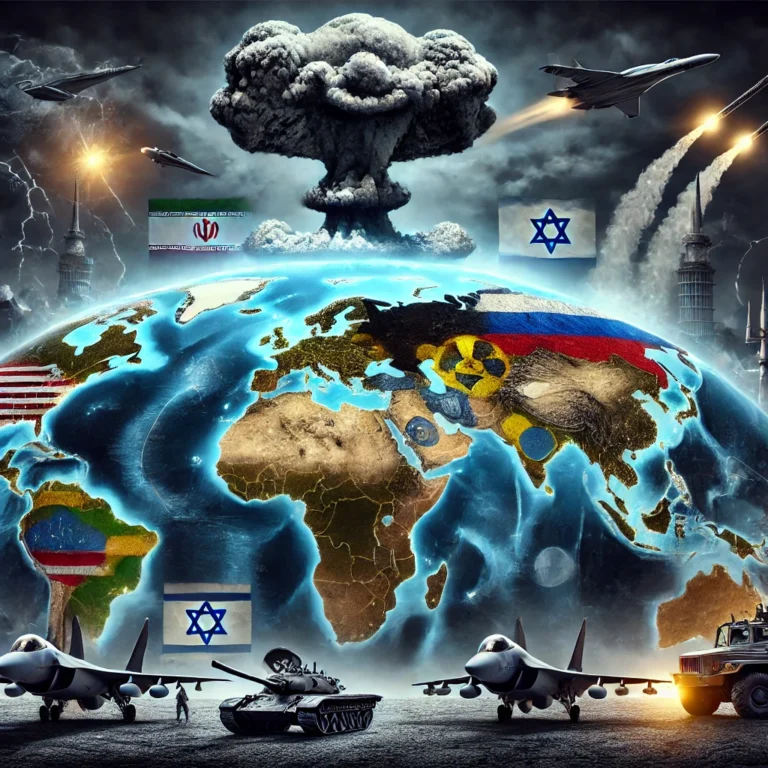In 2024, the shadow of World War 3 looms larger than ever, with the terrifying prospect of nuclear war-a possible nuclear war. It is when global tensions are operated on different fronts, including ongoing Ukrainian war, increased U.S.-China rivalry, and dangerously now Iran-Israel conflict that everyone is asking: are we on the verge of nuclear conflict?
Global Geopolitical Landscape in 2024
The world is experiencing one of the most volatile geopolitical climates at least since the ending of the Cold War. Four areas are quite clearly where significant fault lines exist.
Europe: The Ukraine War and the NATO-Russia Standoff Russia’s invasion of Ukraine, now into its third year, has stabilized into a long-term war, with NATO member states lining up to support Ukraine. Russia’s continued threats to use nuclear weapons against Ukraine or its western supporters have created a level of nuclear apprehension in Europe without precedent. As each side places ever increasing militarization on the table, the risk of miscalculation mounts.
Indo-Pacific: U.S.-China Tensions Another point of friction is the rising tension between the U.S. and China, primarily through Taiwan. China’s assertive posturing toward Taiwan in tandem with its military build-up places it on a collision course with the U.S. Any miscalculation or direct confrontation between such nuclear-armed powers could lead to a global conflict with disastrous consequences.
Iran Israel Conflict: Escalating Risk of Nuclear War
A longtime conflict between Iran and Israel, perhaps it has never appeared more perilous than in 2024. Israel did say it would not allow Iran to become a nuclear power, which seems to bode ill for an Iran that threatens with a potential preemptive attack on Iranian facilities. It would lead to a significant military retaliation from Iran and could even involve some of the regional players like Saudi Arabia, and by extension even world powers, such as the U.S. or Russia.
A war between Iran and Israel that takes the form of a full military conflict has the likelihood of drawing in nuclear forces. Assuming that many believe that Israel is a nuclear armed state, and in the absence of them, that Iranian regime could already initiate a regional war through the actions of its proxies, other nuclear armed states could then be drawn into such conflict and the further possibilities of an all-out global escalation increase.
Abraham Accords have brought Israel closer to several Arab nations. This has complicated Iran’s regional ambitions. Yet, there is still no further layer added to this conflict. If Iran perceives some threat to its survival, it could go to extreme measures; even a push for fast acquisition of nuclear weapons to ultimately tip the balance and make a nuclear confrontation more likely.
What to Do to Avoid World War 3
Once the hope is lost, and people have the feeling of despair, it will be too late. To avoid a nuclear conflict, immediate diplomatic intervention, renewed arms control agreements, and efforts to de-escalate key conflict zones are needed.
Third, diplomacy and arms control: Reopening nuclear talks with Iran and renewed arms control negotiations between the United States and Russia would be steps to lowering the risk of nuclear war. Of course, preventing Iran from acquiring nuclear weapons is crucial, but equally important is preventing already nuclear-armed states from expanding their arsenals.
Re-establishment of Communication Channels: Direct communication between rival nations, especially the high-tension regions like the Middle East, would prevent any accidental escalations. In fact, this is one way in which large-scale wars were avoided between the U.S. and Russia during the Cold War. This should be revived in today’s volatile geopolitical scenario.
International Cooperation: The global powers must share joint undertakings in risks that are not covered by the new technologies of AI and cyber capabilities, which fall through the use in military operations out of inadvertently causing a nuclear conflict.
Regional Stability Initiatives: This is part of the renewed diplomatic work by the United States, the European Union, and regional actors such as Saudi Arabia. Given both sides’ increased conciliatory stances, this should ease tensions between Israel and Iran. Moving toward a nuclear deal or framework no doubt will require engagement by both sides.
Conclusion
This makes the risk of a nuclear World War 3 higher than it has been in decades: with tensions between Iran and Israel brewing, coupled with tensions over Ukraine and the Indo-Pacific, the threat of nuclear war is real.
Diplomacy, arms control, and conflict de-escalation remain a priority to avoid the catastrophic consequences that could be foreseen with nuclear armaments. Though choices today determine the course of history, the stakes have never been higher, and the threat of a nuclear war remains an existential threat to humanity as we know it.


